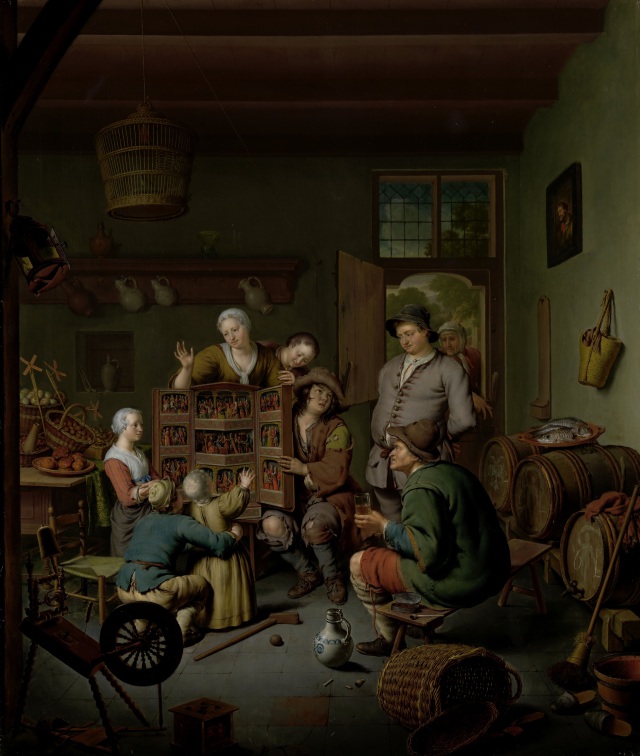What was a raree show? Possibly a name derived from the word rarity, but no-one seems quite sure. It was a peep show, exhibited on the streets of the country, usually by itinerants, much like any other street performers.

The show was often carried around in a wooden cabinet with several viewing holes in which sets of pictures could be set by pulling a corresponding cord, or in a box, as can be seen in this painting above.
The showman then provided a narrative to accompany the images. This post is very much a visual one showing some of the different rarees, along with a few stories from the newspapers.

The newspapers often provided advertisements for such shows and the charge to see them was usually half a penny.
The Oracle and Daily Advertiser 31 August 1803 described that a man with a raree show stopped to exhibit, on Lancashire Bridge, Stockport, one day last week and a crowd of people, as usual, gathered around him.
Amongst them was a solider who wished to have a peep at what was going on inside. He paid his halfpenny and applied his eye to the glass. The show man had shown him half the fine cities in the world, and eventually came to Paris. ‘There is the famous city of Paris’ said the showman, ‘You can see the great Bonaparte haranguing his troops for the invasion of England’. The indignant soldier could contain himself no longer, his fury was roused at the sight of his notorious enemy. He grabbed the show box and threw all the fine cities of the world, along with Bonaparte and his troops, over the bridge. ‘There, and now you see Bonaparte and his troops drowning and be damned to them.’
This image above, is located at the British Museum and The Leeds Intelligencer, 1 June 1779, reported:
A correspondent passing through Whitechapel on Friday observed a man, by his accent a German, exhibiting a halfpenny show to the children. There was something so whimsical in the contents of the show, that our correspondent could not help listening to the man and has brought off s much of the exhibition as his memory would contain; and has endeavoured to reduce it to English, from the jargon in which it was delivered. The article then continued to outline exactly what we are seeing above in the image.

The Globe, 17 August 1826 reported that the collection of the late John Hunter was purchased by Parliament in 1796, and given to the Corporation of Surgeons, on certain conditions, intended to secure the medical world and the public the benefit of this fine collection.
The two main conditions were:
That the collection should be visible, and that it should be intelligible – that it should be open a certain number of days (twice) every week in a year, and that a catalogue of it should be provided.
A collection of anatomical preparations is very ill adapted for a raree show, to be exhibited on feasts and festivals, and, but for these conditions, which secured to studious men, the facilities of frequently examining it, the money spent upon it would have been better bestowed upon puppets or magic lanterns.
Featured Image
Fine Arts Museums of San Francisco – Raree show


I hope the soldier paid damages for destroying that raree box.
LikeLiked by 1 person
I’ve absolutely no idea, but I do hope so 🙂
LikeLike
The soldier probably found himself facing a magistrate.
LikeLiked by 1 person
Pingback: Loyalist Trails 2023-17 – UELAC